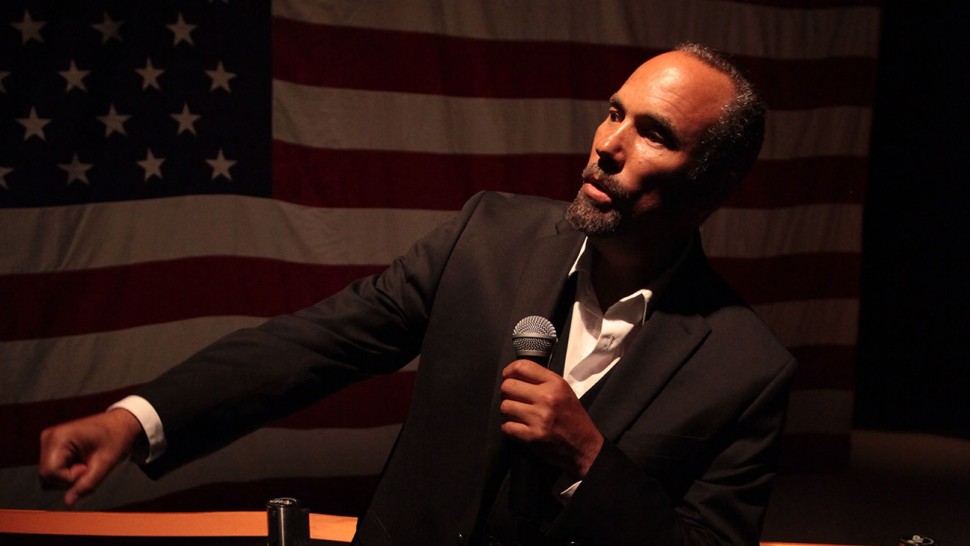“The chief injury lies in the absence of moral feeling in the utterance of our rulers,” abolitionist Frederick Douglass said about Lincoln, when the president indicated his indifference to abolition in a letter to newspaper editor Horace Greeley.
“Frederick Douglass Now,” a one-man show by award-winning writer and actor Roger Guenveur Smith, weaves together contemporary tropes on American race relations and politics with writings from the former slave and famous 19th-century social reformer.
The free public performance will be presented at 7 p.m. Friday, April 6, in the Josephine Louis Theater, 20 Arts Circle Drive on Northwestern University’s Evanston campus. Seating is limited and reservations are recommended. Reserve tickets online before 5 p.m. on April 5.
“Frederick Douglass Now,” is sponsored by Northwestern’s political science department. It is co-sponsored by the departments of African-American studies and history, the Black Arts Initiative and the Office of Institutional Diversity and Inclusion. The show is hosted by the departments of performance studies and theatre, and is also part of the 50th Anniversary Commemoration of the Bursar’s Office Takeover programming.
The show is based on Douglass’ writings, including a letter he wrote to his master 10 years after escape, in which he revealed his connection to the institution of slavery.
“People didn’t believe a black man could have written the letter, or believe he could have been a slave,” Smith said in an interview with public radio station KCRW in Los Angeles. “He had to reveal people he knew as a slave to prove it, which was dangerous. There was a Fugitive Slave Act, and even though he lived as a free man in the North, he had to flee to Europe to work and raise money to purchase his freedom.
“The great tragedy for Douglass, which he communicates in that letter, is being separated from his sisters and brother,” Smith said. “Slavery had broken up the family, and because his siblings were not taught to read and write, they were unable to maintain a connection.”
Smith began work on “Frederick Douglass Now” when he was a student at Occidental College and has been performing it for more than 20 years. He continues to hone and refine it with material culled from newspaper headlines, rap music and gaffes made by celebrities and politicians revealing how far America has come and still has to go in race relations.
Frederick Douglass
Douglass (1818–1895) was born into slavery and died the first African- American to hold a high U.S. government rank. A renowned orator and author, his legacy includes several autobiographies eloquently describing his experiences during slavery and after the Civil War. Douglass served as U.S. ambassador to the Dominican Republic and consul-general to the Republic of Haiti.
Roger Guenveur Smith
Los Angeles-born Smith’s youth and body of work have been impacted by the South-Central race riots. He is the creator of several one-man shows that put African-American issues center stage. His original works include the Obie Award-winning “A Huey P. Newton Story,” which he adapted into a Peabody Award-winning telefilm, and the Bessie Award-winning “Rodney King,” which is currently streaming on Netflix.
He has appeared in eight films by Spike Lee, including “Do the Right Thing,” “Malcolm X” and “He Got Game.” Recent screen credits include roles in “Behind the Movement,” “Dope,” “The Birth of a Nation” and “Queen Sugar.”
Smith’s theater credits include directing Katori Hall’s “The Mountaintop” for the Memphis Martin Luther King 50 Commemoration and “The Hendrix Project,” for the Public Theater’s Under the Radar Festival. He leads a performing history workshop for the California Institute for the Arts.


